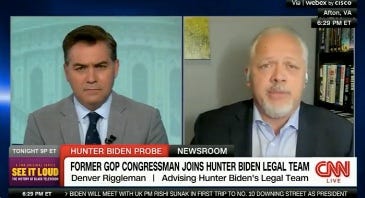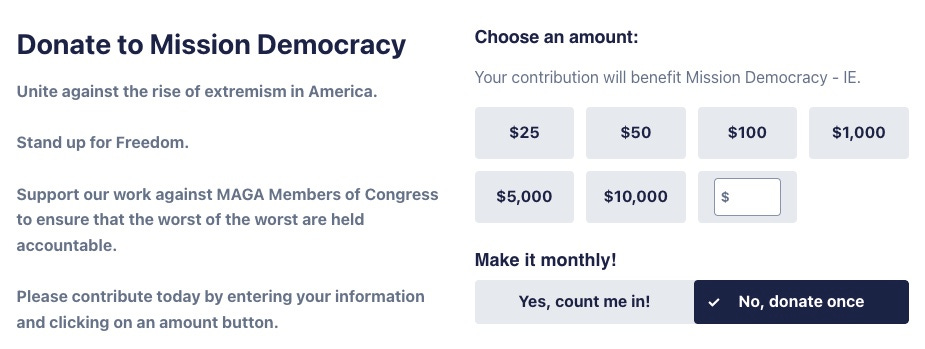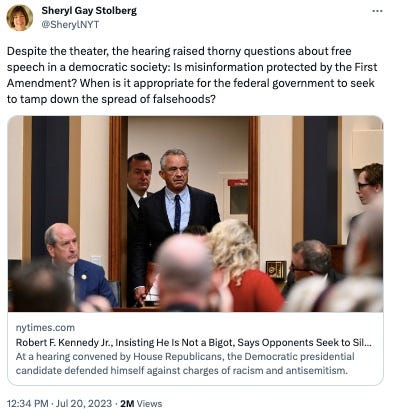Empty Calories
A case study on #Resistance media darling Denver Riggleman, and the state of punditry in America generally
August 2, 2023
Dateline: The week The Bidens acknowledged they had a seventh grandchild through an exclusive statement given to a celebrity magazine in a Friday night news dump
Watching this week…
— Who are our #Resistance pundits, really?
— No “disinformation” introspection yet
— Alarm bells at Washington Post
— Media conformity, social media - FW Pod with Emily Jashinsky
— Great Moments in Stay Scared Journalism
Empty Calories: On Denver Riggleman, source bias, and the state of #Resistance punditry
January 6th is back in the news thanks to the third and certainly not last indictment of former President Donald Trump yesterday, which means it was another opportunity for Denver Riggleman to be on TV, as he was this morning on MSNBC. The one-time GOP congressman, who was a Freedom Caucus member and was twice endorsed by Trump, is a mainstay on TV news as a primary #Resistance pundit, and particularly the NBC cable network and CNN.
Here he was last weekend on Katie Phang’s MSNBC weekend show, for example. In that appearance, Riggleman referenced the mysterious Trump White House phone log gap on January 6 — a talking point that was discredited, by CNN, more than a year ago.
Riggleman rose to prominence in the corporate press thanks to his hiring on the January 6 committee’s “senior staff,” due to, as was announced in August 2021, his previous work in “military intelligence.” He would leave the committee after eight months, and go on to write an unauthorized book about his work, and get a lengthy 60 Minutes puff profile before its release. The committee in turn downplayed his role. “The work of the committee is not built on the bedrock of Denver’s efforts,” they would say, claiming he had “limited knowledge” of the investigation.
That didn’t stop him from crafting a narrative that his forensic work was crucial to what was uncovered. Mark Meadows gave his texts to the committee…what exactly did Riggleman do?
But Riggleman’s more recent work has him going beyond January 6 — as an “advisor” to Hunter Biden’s legal team, focused, again, on… some sort of computer thing. He attempted to explain what he was going to be doing with the Hunter Biden team in a softball interview with Jim Acosta last month (click the screenshot to watch the full interview):
Riggleman said that since late last year, he had provided “technical and analytical support based on computer forensics and phone forensics,” to the legal team. “I love 1s and 0s,” he told Acosta, in one of the many references to “1s and 0s” sprinkled throughout the exchange. “I love forensics. I think we have the best team in the world.”
Ok but what was he doing exactly. The laptop is real — we knew it when it was exposed by the New York Post in October 2020, but we definitely know now, after it’s been verified by outlets ranging from CNN to the New York Times to New York magazine. Even Hunter’s legal team isn’t really disputing that anymore. Riggleman called out “bullies” and “grifters,” and said while searching for “forensic format or forensic validity” that “there was none.”
So…what? “We do have the data, we have the 1s and 0s, we have the facts-based, you know, analysis based on the 1s and 0s that we have," he assured Acosta, and the CNN audience. And later: “We have specific incidents of fabrication and manipulation of the data.”
Oh really? Like what? Acosta didn’t ask. Riggleman was rolling, why stop to get a modicum of clarity? “What individuals need to realize out there is that the truth does matter. And when you have an invasion of privacy like this, somehow this data that's been stolen, or it's been sort of pilfered, and then pressed through the ecosystem in order to make money I think it's absolutely an abomination,” he said. And in summation: “I'm just one guy with a great forensics team, the best in the world.”
I’ve tried to find out more information about what Riggleman has been doing, and learning, for the Hunter Biden legal team. Or for the January 6 committee, for that matter. He has not responded to multiple emails, LinkedIn messages, phone calls, or Twitter messages. I also tried to find what “great forensics team” he was referring to. On LinkedIn, Riggleman describes himself as the CEO of Riggleman Information Intelligence Group. There are no other employees listed besides himself.
Riggleman Information and Intelligence Group LLC was incorporated in Virginia by Riggleman in 2021 — January 5, 2021, to be exact, the day before the riot at the Capitol. The only “team” I can find is Riggleman’s team of family members at Silverback Distillery, the distillery and tasting rooms he owns with his wife and daughters (“silverback” is their nickname for him).
I’m not sure about Riggleman’s experience with Hunter Biden or January 6, but I do know he knows a lot about the media. A series of embarrassing stories about his apparent interest in Bigfoot hounded him during his first Congressional run in 2018. After getting primaried in 2020, he would lean into it, writing a book about Bigfoot that included more than a chapter about Bigfoot erotica and Bigfoot’s genitalia.
These days, in addition to his frequent cable news hits and doing whatever with “1s and 0s” one does for Hunter Biden’s crack legal team, Riggleman is an advisory board member to something called “Mission Democracy,” which promises to “aggressively defend American idealism, freedom, civility, and truth. We will ensure that Americans fully understand the dangers of MAGA Republicans.” Prominently featured is a link to donate:
This former Freedom Caucus member’s organization uses ActBlue, “a powerful online fundraising platform for Democratic candidates up and down the ballot, progressive organizations, and nonprofits.”
How does someone go from getting Trump’s endorsement as late as 2020 to… this? Perhaps it’s about following the money. But despite this focus on Denver Riggleman, this is not really about Denver Riggleman, himself. Instead, it’s about who our media elite prop up to opine to the audience. It’s about the empty calories of #Resistance punditry that fills minutes, and hours, and days.
How do we even know the supposed experts on “1s and 0s” — or anything, for that matter — are actually doing what they say? Do the producers who book these guests count the fact that they’ve been on the air before as the only due diligence needed when it comes to looking into their claims? Does it even matter what the truth is?
The next time someone is yammering about “grifters,” it’s at least worth stopping to ask “who is this person, really?” This is good advice for us in the audience, yes — but it should be a prerequisite for the Acela Media bookers and producers and talent too.
The corporate media is going to be forced into “disinformation” introspection, eventually
Nate Silver has always been an interesting thinker, but since his ABC / FiveThirtyEight exit, he’s been even freer to share his perspective in the most unvarnished way possible. He’s launched a must-read Substack called
, and his recent piece on COVID is a hugely important read. Headlined “Journalists should be skeptical of all sources —including scientists,” Silver uses what we’re learning thanks to the unredacted emails by the GOP House about the COVID origins discussions by our scientific elite back in February and March 2020 to lay out in clear and simple terms how a scandal perpetrated on the American people is both real and important. “As someone who has spent a lot of time trying to convey statistical and epistemic uncertainty to the public, I’m deeply disappointed by the scientists’ conduct here and how unmoored they were from any attempt at truth-seeking,” Silver writes.But it’s not just about the scientists’ conduct then, and certainly not now. “The coverage of the recently leaked emails and Slack messages at major center-left outlets like The New York Times has been pathetic,” Silver writes, of his former publication. “Journalists ought to have decent bullshit detectors — including toward scientists, academics and other experts.”
And yet, in “scandal” after scandal (or “story” after story, if you prefer), the bullshit detectors appear to be malfunctioning — at best. That claim is factually accurate. But the next question is — why?
Here’s part of the answer. Sheryl Gay Stolberg, a New York Times reporter who covers “the intersection of health, policy and politics” (and does she ever!), recently wrote about Robert F. Kennedy Jr.’s testimony before Congress about free speech and censorship. This was how she framed her own reporting on Twitter:
I will attempt to answer these two rhetorical questions. “Is misinformation protected by the First Amendment?” Yes. “When is it appropriate for the federal government to seek to tamp down the spread of falsehoods?” Never.
This isn’t hard. Now, you may disagree with me — that’s ok. I get how other occupations outside the journalistic arena might be more prone to say misinformation isn’t — and shouldn’t be — protected by the First Amendment, or that the government should help censor content so false information doesn’t grow on social media and elsewhere. But if you’re a journalist, you know these are fairly simple answers.
At least, you should, in theory. Stolberg… is a journalist. At the New York Times. And yet she clearly favors this sort of government intrusion on supposed “misinformation,” and appears to be fuzzy about whether it’s even protected by the same right that allows for freedom of the press.
It’s disturbing, but not surprising. And it shows why Nate Silver is speaking more freely on the outside, sadly, than at one of these currently corrupted institutions.
Conformity in Media, Online GOP Dynamics - Fourth Watch Podcast with Emily Jashinsky
One of the highest compliments I can give a member of the media is that they deliver something unexpected — that you can’t predict what they’ll say or write, or the topics they’ll focus on, or even who they might be talking to. In an increasingly polarized media environment, being surprising is a huge asset.
That’s why I was glad to talk to The Federalist culture editor and podcast host, and co-host of Counter Points on the Breaking Points network, Emily Jashinsky, on the Fourth Watch Podcast. Watch a clip of Emily and I talking about corporate vs. independent media (and media conformity more generally), or the “influencer on influencer violence” aspect of the current GOP primary. We also talked culture and geography vs. politics, the dangers of social media, what the Jonah Hill scandal says about our culture, and more.
You can download the full podcast on Spotify, on Apple, or wherever you get your podcasts.
And coming later this month - the Fourth Watch Podcast shuffles format, and tries something different… find it wherever you get your podcasts in a couple weeks (and also, here on Substack, and soon, on YouTube).
The Washington Post is Going to Lose $100 Million. What Are the Larger Implications?
It’s always a bit awkward when the New York Times media team turns its attention to The Washington Post, the little brother in the quest to become an Acela Media-based national powerhouse media outlet. Recently Ben Mullin and Katie Robertson took on WashPost through the Jeff Bezos angle, and noted how the billionaire owner was taking a renewed interest in the business.
Early in the piece were a couple staggering stats: “The Post is on a pace to lose about $100 million in 2023, according to two people with knowledge of the company’s finances; two other people briefed on the situation said the company was expecting to miss its forecasts for ad revenue this year….The Post has struggled to increase the number of its paying customers since the 2020 election, when its digital subscriptions peaked at three million. It now has around 2.5 million.”
That’s an alarming situation, but also one that’s instructive as a case study. The Washington Post went all-in on the Trump phenomenon, and staffed up based on a media environment that no longer exists, and, perhaps, never will again. In some ways, it mirrors ESPN’s current situation, where it laid off some of its biggest, and most expensive, talent (and continues to this week).
I wrote about ESPN, the big-money losers, and the rare winners in the space - like Pat McAfee - in a recent Rabbit Hole deep dive column:
Rabbit Hole: Why Pat McAfee is Winning While So Many Others in Media are Losing
Rabbit Hole” is a single-topic deep dive column that comes out twice per month for paid subscribers. The free newsletter returns later this week. Former ESPN host and current DraftKings-sponsored content creator Dan Le Batard was going after his former ESPN colleague Stephen A. Smith in
WATCH IT… CNN’s Kyung Lah decided to go to a Walgreen’s in San Francisco and just hang out and see what happens. She and her camera crew witnessed three robberies there in the span of 30 minutes. This is what journalism should be all about — show, don’t tell. Now hopefully CNN will stay on the story, and start to explore why this is happening, and the consequences of no consequences.
HEAR IT… Barbie…Oppenheimer… it’s the movie event double-feature of the last… decade maybe? Ringer’s The Big Picture podcast breaks down both films in intricate detail, and sells both pretty hard. Both seem deep and interesting — and have some similar themes, if you squint hard enough. Either way, with their box office success and creative marketing pushes, we’ll be talking about them separately, and together, for awhile.
READ IT… And sticking with Barbie — and now connecting it to the Taylor Swift tour phenomenon — and interesting piece from Michelle Goldberg in the New York Times: “After years of Covid isolation, reactionary politics and a mental health crisis that has hit girls and young women particularly hard, there’s a palpable longing for both communal delight and catharsis.”
QUICK HITS
Variety’s Tatiana Siegel goes way down the CNN rabbit hole for a deep dive on the past 18 months, dishing dirt on Zucker, Zaslav, and Licht. And then the media world started flipping out over it — although Variety is standing by it.
Fox News’ first week with its new primetime line-up had a solid ratings uptick from the previous post-Tucker norms.
Elon Musk has rebranded Twitter as simply “X” — is there a method to the madness, or just YOLO?
Speaking of X, Sara Fischer at Axios looks at Threads’ launch, and the “copycat conundrum” of social media companies in recent years.
Interesting moment from the Hannity RFK Jr. town hall, where Hannity pressed RFK hard on Ukraine, but RFK seemed to have the audience on his side.
The recent UFO / UAP congressional hearing didn’t have much new info for those of us who have been following the developments closely — but it’s all under oath now, which is definitely something.
⏪ REWIND // FAST FORWARD: Obnoxious Reporter Edition ⏩
⏪ Back during the Trump years, Jim Acosta often got glowing, back-pat-y coverage from his peers while he made the White House briefing room a performative exercise in brand-building. (He gave journalists a bad name — still, I defended his right to be there when the Trump administration briefly took away his pass.)
⏩ The new Jim Acosta, in a way, is Simon Ateba, an African correspondent who has made it a regular occurrence to interrupt the briefings. He’s pretty explicit about it being a brand-building exercise too, even if his questions are often relevant. The New York Times recently profiled him, and while it was fair, the framing certainly was not what the Acosta’s of the world got during the last administration.
MORE TK…
We know there’s a revolving door between politics and corporate media, no matter which party is in office. But as CNN announces the hiring of yet another Biden White House top staffer, former comms director Kate Bedingfield, there’s something extra icky in the air. Biden is running for re-election, and his first term comms team is spread out throughout CNN and MSNBC (Jen Psaki). Sure, no one expects objectivity from a pundit, but there’s no doubt going to be direct message coordination now as well. Something to cover as the season heats up…
GREAT MOMENTS IN JOURNALISM
There’s dangerous fear-mongering, and there’s hilarious fear-mongering — this, from the New York Times, belongs in the latter category. Don’t go outside!
Thanks for reading. Back soon with a new “Rabbit Hole” deep dive, on Elon Musk’s Twitter X…
—Steve






